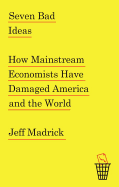
In his introduction to Seven Bad Ideas, Jeff Madrick (Age of Greed) says that economists could benefit from advice Henry James once gave his students: "Any point of view is interesting that is a direct impression of life. You should consider life directly and closely." Madrick's stance is that mainstream economists rely too heavily on theory that doesn't hold up in practice. To illustrate and support his position, he explains seven economic principles that have driven policy since the 1970s and offers evidence of how they have failed not only the American people but the entire world. If politicians continue to follow these damaging ideas, he warns, they could hold the United States back for decades.
Throughout the country, most colleges teach the same conservative economic notions, passing these problematic theories along to the future economists; very few include a course on the development of these theories. Madrick says, "history is rarely a cherished discipline among economists, and case studies are too often neglected." Here, he uses historical examples and data to show government's leading role in innovation, the results of deregulation, flaws in low inflation and austerity economics, and the need for community-mindedness in a successful economy.
Readers don't need to be finance specialists to understand Seven Bad Ideas. Industry jargon, when used, is clearly explained and Madrick often provides vivid analogies to make the concepts even more accessible. Dishing up more than just blunt criticism, Madrick offers alternate approaches. If there were an eighth bad idea, it would be ignoring this book. --Jen Forbus of Jen's Book Thoughts

